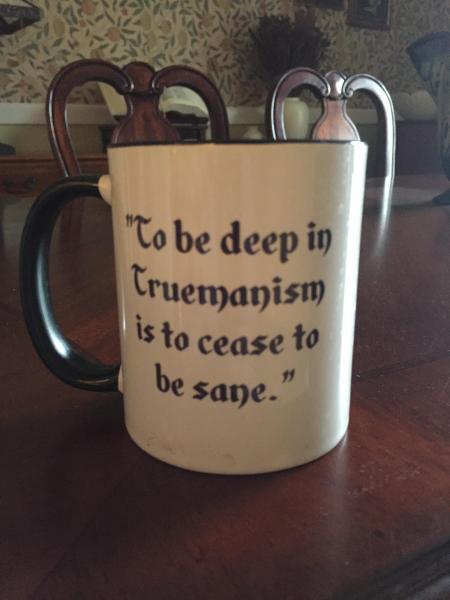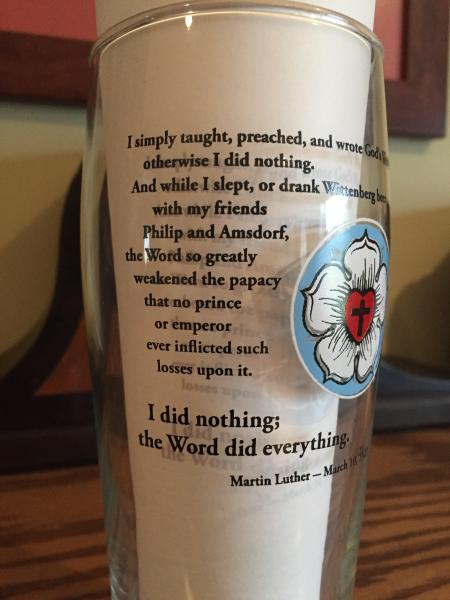Luther, Beer and 1522

I have received unexpected and unsolicited gifts of two drinking vessels recently. The first, from the person we at the Spin know simply as Evil Amy the Less, the author who last year had the slanderous temerity to base (and indeed name) the character of an alcoholic priest in her novel of medieval times upon a distinguished and universally loved and respected church historian, needs no further comment.
the slanderous temerity to base (and indeed name) the character of an alcoholic priest in her novel of medieval times upon a distinguished and universally loved and respected church historian, needs no further comment.
 The second, however, provoked more substantial historical ruminations. It arrived yesterday and is a beer glass with one of my favourite Luther quotations inscribed upon it, taken from one of the Invocavit Sermons of 1522. The curvature of the glass means that the picture is not entirely legible but the whole statement reads as follows:
The second, however, provoked more substantial historical ruminations. It arrived yesterday and is a beer glass with one of my favourite Luther quotations inscribed upon it, taken from one of the Invocavit Sermons of 1522. The curvature of the glass means that the picture is not entirely legible but the whole statement reads as follows:
“I simply taught, preached, and wrote God’s Word; otherwise I did nothing. And while I slept, or drank Wittenberg beer with my friends Philip and Amsdorf, the Word so greatly weakened the papacy that no price or emperor ever inflicted such losses upon it.”
I love this quotation, mainly because it references beer and thus clearly indicates that no Southern Baptist leader could ever claim Luther as an antecedent (and that is even before we touch upon his theology of baptism, the Lord’s Supper etc etc etc). Bear that in mind during this 500th anniversary year.... But I also love it because it rests upon Luther’s supreme confidence in the proclamation of the Word.
In the popular imagination, it is the Diet of Worms where Luther is at his most vulnerable, standing before the massed elite of the Holy Roman Empire, to defend his theology (and I have a porcelain beer growler commemorating that scene). In fact, other moments were equally risky – Augsburg in October 1518, for example. And we also know in retrospect that Frederick the Wise had instructed his equivalent of the special forces to make sure Luther was kept safe. Hence, his ‘kidnapping’ and subsequent sojourn in the Wartburg Castle under the pseudonym Junker Georg.
But while Luther stayed at the Wartburg, leadership in Wittenberg passed to his colleagues, the non-descript but radically inclined Konrad Zwilling, the young and gentle Philip Melanchthon, and the passionate Andreas Bodenstein von Karlstadt.
Karlstadt had been Luther’s senior colleague. He was part of the Wittenberg faculty theological discussions driven by the rediscovery of the works of Augustine. He had stood shoulder to shoulder with Luther at the Leipzig Disputation in April 1519. Yet he was flawed. Too verbose for his own good, it was inevitable that he would be literarily eclipsed by the talented pen of Doctor Martin. And he tended towards a transformationist theological vision.
Late in 1521, Karlstadt and Zwilling started to drive the Wittenberg reformation in a radical direction. Stirring up iconoclasm and riots, Karlstadt took to walking around Wittenberg dressed as a peasant and officiating at mass in a plain robe. Then three individuals arrived, the Zwickau Prophets, who believed in the continuing direct leading of the Holy Spirit and thereby neglected the crucial centrality of the Word and the inseparability of Word and Spirit.
Wittenberg looked set to descend into chaos. Luther returned incognito in December 1521 and, while pleased at the strides the reforms were making, he was deeply disturbed by the chaotic atmosphere and the iconoclasm. Then, in early 1522, the Elector recalled him to the town permanently.
This was the moment Luther was most vulnerable. Like Will Kane in High Noon, he was now totally alone. His theological allies were either too timid or had gone over to the charismatic lunacy of the men from Zwickau. The knights were conspicuous by their absence. And the Elector was waiting to see what would happen: he knew that if the reformation in Wittenberg could not be brought under control, he risked invasion from the Emperor; if Luther failed, Frederick would have to reimpose the old ways. Luther had no decisive allies. It was all down to him.
In this context Luther quite literally preached the reformation back onto a stable footing in a remarkable series of pulpit performances which come down to us as the Invocavit Sermons on 1522. By the time he had finished, the Zwickau whackos were gone, and Zwilling and Karlstadt had had to leave Wittenberg. Luther was back in control with Melancthon as his gentle second-in-command. Others, like Justus Jonas, who had been swept up in the madness had returned to sanity. All was well. Luther had preached God's Word and God's Word had done it all. And it is from these – and from that crisis moment – that this quotation is drawn.
So every time I sip the amber nectar from this wonderful glass, I will thank God that I am not a Southern Baptist and then I will praise him for the power of his Word as so admirably demonstrated in Wittenberg in the dark months of early 1522.
POSTSCRIPT: The glass is produced by Reformation Glass whose products are available via Amazon but not through the SBC.




